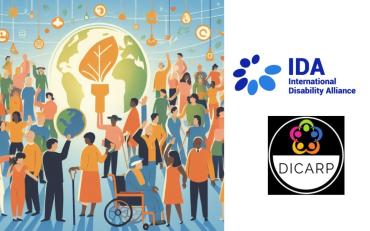Dubai, UAE – Today, the Disability Inclusive Climate Action Research Program at McGill University and the International Disability Alliance (IDA) released the 2023 edition of their report on Disability Inclusion in Domestic Climate Policies. This report provides an up-to-date analysis of the inclusion of persons with disabilities and their rights in the climate policies adopted by the 195 parties to the Paris Agreement.
This new report provides a systematic assessment of whether and to what extent states are fulfilling their obligations under the United Nations Convention on the Rights of Persons with Disabilities (CRPD) in the context of their Nationally Determined Contributions (NDCs) and their climate adaptation policies.
The report finds that only 39 of the 195 state parties refer to persons with disabilities in their NDCs – a figure that indicates almost no progress since last year’s report. A closer look at how people with disabilities are included in these 39 NDCs reveals that most of the references to disability in countries lack specificity and depth.
The report also reveals that 65 of 195 parties to the Paris Agreement currently refer to people with disabilities or disability in some way in their climate adaptation policies. This is a significant increase since the first McGill / IDA status report in 2022 which found that only 46 parties had done so. Although this is an encouraging development, it still means that 67% of parties do not currently refer to people with disabilities in any way in their climate adaptation policies.
“The international community has recognized that persons with disabilities are disproportionately affected by climate change as well as inaccessible climate measures. However, 80% of parties to the Paris Agreement do not mention them in any way in their NDCs and 67% do not include them in their adaptation policies. We are at the frontline of the impact but sidelined by policies. It is completely unacceptable that governments worldwide are systematically failing to fulfill their international obligations under the CRPD and the Paris Agreement,” explained Jose Viera, Advocacy Director at the International Disability Alliance.
For the first time, the 2023 report assigns each country a score (out of 13) that reflects their global performance in disability-inclusive climate policymaking across both their NDCs and climate adaptation policies. In an encouraging sign, a few countries are starting to stand out in their commitment to disability-inclusive climate action, including Canada, Costa Rica, Sierra Leone, Cabo Verde, and Kiribati. On the other hand, 94 states achieve a global score of 0, which means that neither their NDCs nor their adaptation policies include even a single reference to persons with disabilities.
“Many policies only mention persons with disabilities in a list of groups deemed vulnerable and do not include any concrete measures to ensure that their rights, leadership, and knowledge are properly integrated into climate initiatives,” said Sébastien Jodoin, an Associate Professor of Law at McGill University and one of the main authors of the report. “Another striking finding from our new global assessment is that countries from the global south tend to outperform countries from the global north when it comes to disability-inclusive climate policymaking. Because they bear the greatest historical responsibility for the climate crisis and have more resources at their disposal, industrialized states must do more to lead by example and support the efforts of developing countries in this field.”
As COP28 is ongoing in Expo City Dubai right now with significant growth in the participation of persons with disabilities and disability advocates, States have the opportunity to demonstrate leadership in disability-inclusive climate action. This is an ideal opportunity to open the space for persons with disabilities and their organizations to join the drafting process.
“Many countries are currently in the process of renewing their climate policies within the next coming years. It is critical that they develop climate policies that include concrete rights-based actions to address the disproportionate impacts of climate change and ableist climate action on people with disabilities,” explained Elham Youssefian, who facilitates disability advocacy for the International Disability Alliance and its partners at COP-28. “Given the lack of attention that people with disabilities have received in the field of climate change, it is urgent that states adopt plans and create mechanisms to promote disability-inclusive climate action in the UN climate regime and other multilateral programs.”
Contact Information
For additional commentary on the report’s key findings and recommendations, contact:
Elham Youssefian
Senior Advisor on Humanitarian, Disaster Risk Reduction, and Climate Action
International Disability Alliance
eyoussefian [at] ida-secretariat.org
For additional information on the report, its methodology, and findings, contact:
Sébastien Jodoin
Associate Professor & Director of the Disability-Inclusive Climate Action Research Programme
McGill University, Faculty of Law
sebastien.jodoin-pilon [at] mcgill.ca
Background on the Report
Since 2022, the Disability-Inclusive Research Program at McGill University (DICARP) and the International Disability Alliance (IDA) have monitored national climate policies by States Parties to the Paris Agreement. Through a systematic approach, a team of coders collects domestic climate policies and assesses their compliance with key obligations set out in the United Nations Convention on the Rights of Persons with Disabilities.
Glossary of Terms
Adaptation policies set out the steps that states will take to ensure that their infrastructure and population can cope with and adjust to the impacts of climate change.
NDCs are non-binding communications that states must submit to the UNFCCC every five years in which they set out the steps that they will take to reduce GHG emissions and adapt to the impacts of climate change.
The Paris Agreement is the long-term agreement for climate action adopted in 2015 under the United Nations Framework Convention on Climate Change (UNFCCC).
The United Nations Convention on the Rights of Persons with Disabilities is an international treaty that obliges states to respect, protect, and fulfill a comprehensive set of human rights held by persons with disabilities. It has been signed and ratified by all but three of the 195 parties to the Paris Agreement.

